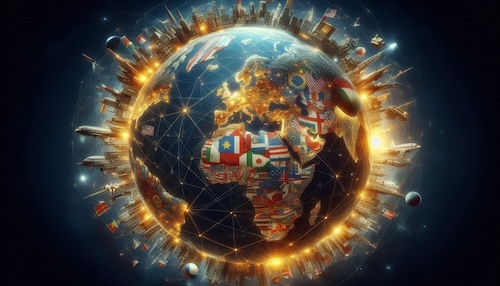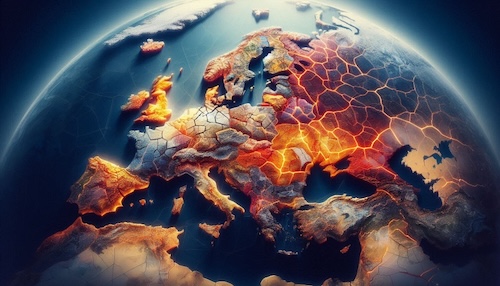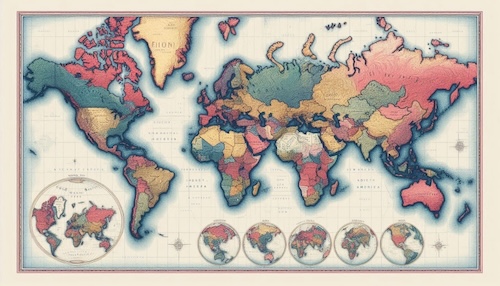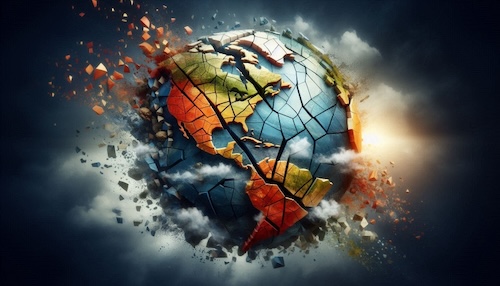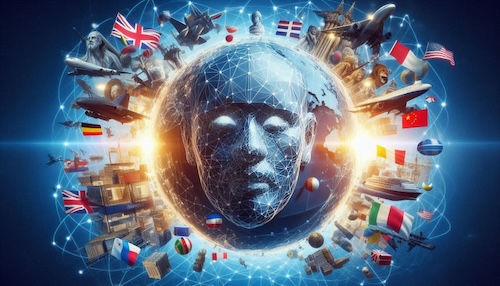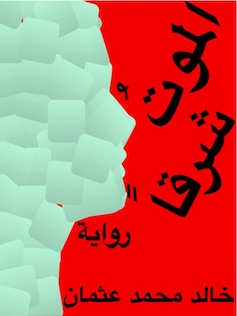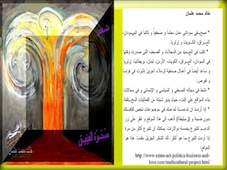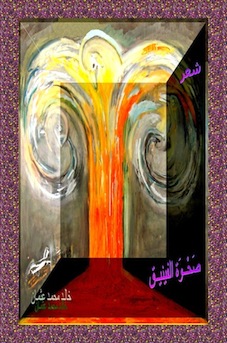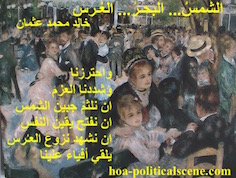How Economics, Ideology and Geopolitics Fragment and Create Nations?
Reading "How Economics, Ideology and Geopolitics Fragment and Create Nations?" will take you through a captivating analysis of historical eras to discover the Forces that divide & create new divided countries in this world, which ignore the fact that the strength of any nation is based on its ideological unity. You will relaize that the fragmentation of these nations is not working for their benefits, but instead for more complexity of wars and divisions. Such similar dynamics of economics, ideology and geopolitics have continued through long history to fragment and build new nations, as if they are the engines that drive history.
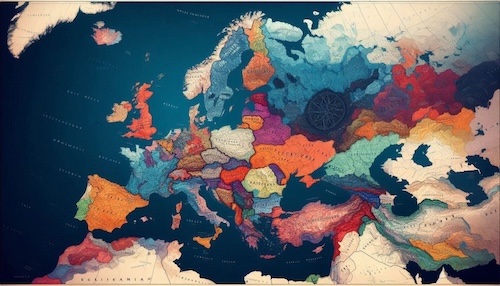 How Economics, Ideology and Geopolitics Fragment and Create Nations?: Eastern Europe Socialist Bloc divided into small nations that have not any strength.
How Economics, Ideology and Geopolitics Fragment and Create Nations?: Eastern Europe Socialist Bloc divided into small nations that have not any strength.This phenomenon is not solely tied to the Colonization Era, often referred to as the pre-Cold War Era, nor to the Cold War Era, despite originating in that period. Instead, it continues to be actively practiced in the post-Cold War Era, sometimes described as the New World Order. This continuity highlights the shared elements across historical eras, from the pre-Cold War Era to the present.
This is why we have many interconnected pages, including this one, that I have started written at the time when the U.S. government presented the new economical shifts, through Trump's Tariffs. I did this research to examine past eras and see the economical connection between them:
The interconnected pages
- Why Expanding Horn Africa to Include Other States and Global Impacts?
- A New Era of Chaos and Distrust is Shaping!
- Pre-Cold War Era of Colonialism & Imperial Rivalries!
- Pre-Cold War American Expansionism!
- The Cold War Era: A Battle of Ideologies and Influence!
- Why Do Nations Fragment When Unity is Their Greatest Strength?
- Eastern Europe Socialist Bloc Fragmentation!
- The Sudanese Muslim Brothers and the U.S. have Created Int Terrorism!
- Eritrea Was Too Late to Independence Due to Colonial Conspiracies!
- Namibian Road to Independence From Liberation to Sovereignty!
- The Post-Cold War Era: A Shifting Global Landscape!
- How Economics, Ideology, and Geopolitics Fragment Nations and Create New Ones?
- New World Order: Stability or Chaos?
- Why Am I Saying A New Era of Disorder and Doubts is Shaping?
How Economics, Ideology and Geopolitics Fragment Nations and Create New Ones?
The Forces That Shape Nations: Economics, Ideology, and Geopolitics:
Nations are not static entities; they evolve, fragment, and sometimes disappear altogether. The interplay between economics, ideology, and geopolitics has historically been the driving force behind the formation and dissolution of states. This article explores how these factors contribute to fragmentation and nation-building.
1. Economics: The Engine of Nationhood
Economic prosperity, or the lack thereof has been a major factor in shaping nations. Trade routes, resource distribution, and industrialization have historically determined the strength and survival of states. Economic disparities often lead to fragmentation, as seen in the collapse of the Soviet Union, where economic inefficiencies contributed to its dissolution.
2. Ideology: The Unifying or Dividing Force
Ideologies, whether political, religious (although I don't consider the last one an ideology, or social can unite people under a common identity or drive them apart. The Cold War Era saw the world divided into capitalist and communist blocs, leading to the fragmentation of regions based on ideological lines. Similarly, nationalist movements have led to the creation of new states, such as the breakup of Yugoslavia.
3. Geopolitics: The Battle for Influence
Geopolitical tensions often lead to fragmentation as global powers exert influence over regions. The post-World War II order saw the emergence of spheres of influence, where superpowers shaped the political landscape of various nations. More recently, economic fragmentation has been observed as trade policies shift due to geopolitical rivalries.
The fragmentation and creation of nations are deeply intertwined with economic conditions, ideological shifts, and geopolitical strategies. As the world continues to evolve, these forces will remain central to shaping the future of global politics.
How Economics Fragment and Create Nations?
Throughout history, nations have risen and fallen, often shaped by economic forces. While political ideologies and geopolitical tensions play their roles, economics remains a fundamental driver of national fragmentation and formation. From trade networks to financial crises, economic conditions dictate whether a nation thrives, fractures, or emerges anew.
1. Economic Prosperity as a Unifying Force
A strong economy fosters national unity. When a country experiences sustained economic growth, its citizens benefit from improved living standards, infrastructure, and employment opportunities. Economic prosperity often strengthens national identity, as seen in post-war recoveries like Germany and Japan, where economic success reinforced social cohesion.
2. Economic Inequality and Fragmentation
Conversely, economic disparities can lead to fragmentation. When wealth is concentrated in certain regions or among specific groups, tensions arise. The divide between rich and poor can fuel separatist movements, as seen in cases like Scotland’s push for independence from the UK, partly driven by economic grievances. Similarly, economic inequality contributed to the breakup of Yugoslavia, where wealth disparities between republics intensified nationalist sentiments.
3. Trade and the Birth of Nations
Trade networks have historically shaped nations. The rise of powerful trading hubs, such as Venice and the Dutch Republic, led to the formation of independent states driven by commerce. In modern times, economic alliances like the European Union demonstrate how trade can unify nations, while trade wars and protectionist policies can lead to fragmentation.
4. Financial Crises and National Breakdowns
Economic instability can dismantle nations. The Great Depression weakened governments worldwide, leading to political upheavals and territorial shifts. More recently, the 2008 financial crisis exposed vulnerabilities in global economies, causing social unrest and fueling separatist movements in regions struggling with economic recovery.
5. Resource Distribution and Territorial Conflicts
Natural resources play a significant role in shaping national borders. Countries rich in oil, minerals, or fertile land often face internal divisions over resource control. The division of Sudan into Sudan and South Sudan was largely driven by disputes over oil wealth. Similarly, economic dependence on resource exports can make nations vulnerable to external pressures, influencing their political stability.
Economics is a powerful force in shaping nations. Whether through prosperity, inequality, trade, financial crises, or resource distribution, economic conditions dictate the fate of states. As globalization continues to evolve, nations must navigate economic challenges to maintain stability or risk fragmentation.
How Ideology Fragments and Creates Nations?
Throughout history, ideology has been a powerful force in shaping nations. Whether religious, political, or social, ideological movements have united people under common beliefs or driven them apart. From revolutions to civil wars, ideological shifts have led to the formation of new states and the dissolution of old ones. This article explores how ideology fragments and creates nations.
1. The Unifying Power of Ideology
Ideology can serve as a foundation for national identity. Shared beliefs—whether democratic principles, religious values, or revolutionary ideals can bring people together under a common cause. The American Revolution, for example, was driven by the ideology of self-governance and individual liberty, leading to the creation of the United States. Similarly, the rise of communism in the 20th century united various nations under a shared economic and political vision.
2. Ideological Divisions and Fragmentation
While ideology can unite, it can also divide. Conflicting beliefs often lead to national fragmentation, as seen in the split between North and South Korea, where communist and capitalist ideologies created two separate states. The Protestant Reformation in Europe led to religious fragmentation, reshaping national borders and fueling conflicts between Catholic and Protestant regions.
3. Nationalism and the Birth of New States
Nationalist ideologies have played a significant role in the creation of nations. The breakup of the Austro-Hungarian and Ottoman Empires was largely driven by nationalist movements seeking independence. More recently, ideological nationalism led to the dissolution of Yugoslavia, where ethnic and political divisions resulted in the formation of multiple new states.
4. Revolutions and Ideological Shifts
Revolutions often lead to ideological transformations that reshape nations. The French Revolution replaced monarchy with republican ideals, fundamentally altering France’s political structure. The Russian Revolution established a communist state, leading to the creation of the Soviet Union. These ideological shifts not only changed national governance but also influenced global political landscapes.
5. Ideology in Modern Geopolitics
In today’s world, ideological conflicts continue to shape nations. The rise of populism, liberalism, and authoritarianism influences national policies and international relations. Ideological divides between democratic and autocratic states affect global alliances, trade, and security, demonstrating that ideology remains a driving force in national fragmentation and formation.
Ideology is a powerful force in shaping nations. Whether through unity, division, nationalism, revolution, or modern geopolitics, ideological movements dictate the fate of states. As global ideologies continue to evolve, nations must navigate ideological challenges to maintain stability or risk fragmentation.
How Geopolitics Fragments and Creates Nations?
Geopolitics... the strategic interactions between nations has long been a driving force behind the formation and fragmentation of states. Borders shift, alliances form, and conflicts arise based on geopolitical interests. Whether through war, diplomacy, or economic influence, geopolitics shapes the global map in profound ways.
1. Territorial Disputes and Fragmentation
One of the most direct ways geopolitics fragments nations is through territorial disputes. Conflicts over land, resources, or strategic positions often lead to the division of states. The partition of India and Pakistan in 1947 was driven by geopolitical tensions, as was the breakup of Sudan into Sudan and South Sudan due to disputes over Sharia laws and power sharing between north and south. Check the pages about Sudan in this network.
2. The Role of Global Powers in Nation-Building
Superpowers have historically played a role in shaping nations. The Cold War saw the United States and the Soviet Union influencing the creation and division of states based on ideological and strategic interests. The division of Germany into East and West was a direct result of geopolitical rivalries, while the collapse of the Soviet Union led to the emergence of multiple independent nations.
3. Geopolitical Alliances and Their Impact
International alliances can either unify or fragment nations. Organizations like NATO and the European Union have strengthened national cooperation, while shifting alliances have led to fragmentation. Brexit, for example, was a geopolitical decision that altered the structure of the European Union, demonstrating how geopolitical shifts can redefine national boundaries.
4. Wars and the Redrawing of Borders
Wars have historically been a major force in reshaping nations. The aftermath of World War I led to the dissolution of empires and the creation of new states, such as Czechoslovakia and Yugoslavia. More recently, conflicts in the Middle East have resulted in shifting borders and the emergence of autonomous regions.
5. Economic Geopolitics and Nation Formation
Geopolitical strategies often involve economic influence. Trade agreements, sanctions, and economic dependencies can lead to fragmentation or unification. The rise of China as a global economic power has influenced geopolitical alignments, with nations adjusting their policies based on economic partnerships.
Geopolitics remains a powerful force in shaping nations. Whether through territorial disputes, global power struggles, alliances, wars, or economic influence, geopolitical dynamics dictate the fate of states. As the world continues to evolve, nations must navigate geopolitical challenges to maintain stability or risk fragmentation.
How Religion Fragments and Creates Nations?
First of all, religion has nothing to do with state governance. The term "state" define its mechanisms, which are political and the religion is a just a religion with its religious beliefs and not political in any way. That definition of the "states" defines it identity as secular, especially when the people in that "state" have many beliefs.
In these modern days, with all of knowledge and development of nations religion please is between believers and in their holly places and it should run with the flow of free beliefs, free expression and free opinion. Through history religion has influences many periods from the old days even before the historical ears we cover here.
The following lines indicate the problems religion causes when it interferes with politics and takes steps into it, despite what roles it plays through hisotory. We are not living in history, but in modern days.
Religion has played a central role in the formation and fragmentation of nations. It has served as a unifying force, creating strong national identities, but has also been a source of division, leading to conflicts and territorial shifts. From ancient civilizations to modern states, religious beliefs have influenced governance, law, and social structures, shaping the destiny of nations.
1. Religion in History
Throughout history, religion has been a cornerstone of national identity. Shared religious beliefs foster a sense of belonging and unity among people. The establishment of the Vatican as an independent state is a prime example of how religion can create a nation. Similarly, Islamic states have historically formed around religious principles, with governance deeply rooted in religious law.
2. Religious Conflicts and Fragmentation
While religion can unite, it has also been a major source of division. Religious conflicts have led to the fragmentation of nations, as seen in the Protestant Reformation, which divided Europe into Catholic and Protestant regions. The partition of India and Pakistan in 1947 was largely driven by religious differences, leading to the creation of two separate nations.
3. The Role of Religious Nationalism
Religious nationalism has played a significant role in shaping nations. Movements that intertwine religious identity with national identity often lead to the formation of new states. The establishment of Israel was driven by Jewish nationalism, while the rise of Islamic republics has reshaped political boundaries in the Middle East.
4. Secularism and Nation-Building
In contrast, secularism has influenced the formation of modern nations by separating religion from governance. Countries like France and Turkey (which is ruled by Islamic party) have adopted secular policies to prevent religious divisions, promoting national unity based on civic identity rather than religious affiliation.
5. Religion in Contemporary Geopolitics
In today’s world, religion continues to shape national boundaries and political alliances... a matter that causes man conflicts in the world. Religious tensions influence global conflicts, migration patterns, and diplomatic relations. The rise of religious extremism has led to territorial disputes and the redefinition of national identities.
How Great Power in the World Use Religion on Its Politics?
That is the question which reveals shifting the ideological struggle between capitalism and communism to a religious one. Continue this orientation at the sections of the Global Dynamics below.
HOA Global Dynamics: Exploring How Economics, Ideology & Geopolitics Shape Nations!
Before addressing the question posed in How Economics, Ideology, and Geopolitics Fragment and Create Nations, HOA Global Dynamics first examines and analyzes global challenges. It delves into political history from the pre-Cold War era to the present, exploring emerging issues and the profound influence of economics, geopolitics, and ideology on world development.
In addition, the solutions are set-up in a fundamental grassroots process that enable the world people to to know exactly how to solve these problems facing our world. There are impressive scientific mechanisms that should be built from the bottom up to maintain the success of the world people rising. You know that you can build a house for example from the surface of the ground!
Additionally, the solutions are designed as a fundamental grassroots process, empowering people worldwide to understand and address the challenges facing our world. Innovative scientific mechanisms have already been prepared from the ground up to ensure lasting success in humanity's progress... just like a house that requires a deep, sturdy foundation beneath the surface to ensure strength and longevity.
For years, following the collapse of the world order and global political system, I have worked to develop the Global Dynamics framework. I have already tested one of the core components of these dynamics, mobilizing around 5,000,000 people to plant more than 5,000,000 trees in Eritrea... laying the grassroots foundation, mechanisms, and fundamental law for establishing the national environmental organization there. This serves as clear proof that the grassroots elements of the Global Dynamics, outlined in the Action Guide, have the power to shape a new world. You can explore this specific topic further in the sections of the Global Dynamics.
How Economics, Ideology and Geopolitics Fragment and Create Nations?: From Empires to Exploration: The Lessons We Failed to Learn! [Latest on The Insight Lens: May 9, 2025] Support me here Incredible videosHow Economics, Ideology and Geopolitics Fragment and Create Nations?: A Neutral Ground? Switzerland’s Role in U.S.-China Trade Talks! [Latest on The Insight Lens: Sunday, May 11, 2025] Support me here Follow the Insight Lens
How Economics, Ideology and Geopolitics Fragment and Create Nations?: Trump’s Tariff Tango: A Strategic Play or Political Theater? [The Insight Lens: 2025-04-25]
How Economics, Ideology and Geopolitics Fragment and Create Nations?: China's Grip on Wellness Products! [Latest on The Insight Lens: 2025-04-22]
How Economics, Ideology and Geopolitics Fragment and Create Nations?: China’s Tech Dominance vs. Global Trade Battles! [Latest on The Insight Lens: 2025-04-19]
How Economics, Ideology and Geopolitics Fragment and Create Nations?: Robotic News Anchors: Reporting on Market Shocks and Trade Tensions! [Latest on The Insight Lens: 2025-04-23]
How Economics, Ideology and Geopolitics Fragment and Create Nations?: A Burning Planet and Trade Wars: The Crisis We Refuse to Face! [Latest on The Insight Lens: 2025-04-24]
How Economics, Ideology and Geopolitics Fragment and Create Nations?: Trade Wars - Trade Wars & Trump’s Visa Policy: The Future of Global Education! [The Insight Lens: 2025-04-18]
How Economics, Ideology and Geopolitics Fragment and Create Nations?: Trade Wars - Tariffs and Turmoil: Protest, Policy, and the Road Ahead! [Latest on The Insight Lens: 2025-04-18]
How Economics, Ideology and Geopolitics Fragment and Create Nations?: Biovians Speak Out: A Trade War Through Nature’s Lens! [The Insight Lens: 2025-04-24]
How Economics, Ideology and Geopolitics Fragment and Create Nations?: AI-Powered Newsrooms: Robots Reporting Today’s Global Realities! [The Insight Lens: 2025-04-25]
How Economics, Ideology and Geopolitics Fragment and Create Nations?:Trade Wars Through Time: Historical Battles and Cultural Fallout! [Latest on The Insight Lens: 2025-04-19]
How Economics, Ideology and Geopolitics Fragment and Create Nations?: Trade Wars: Unmasking the Free-Market Illusion! [Latest on The Insight Lens: 2025-04-19]
What Do You Think of "How Economics, Ideology and Geopolitics Fragment and Create Nations"?
If you were here, then that means you have read 'How Economics, Ideology and Geopolitics Fragment Nations and Create New Ones'. You can use the following comments form to let me know hat do you think. I'll definitely appreciate your interaction with this page. Thank you.
Have A Great Story About This Topic?
Do you have a great story about this? Share it!
Did you get any of my books from Apple Books?
Click here to tell me & get some free books. Fill the form.
رواية "الموتُ شرقاً" تكشف لك سرّ الموت الشرقي التراجيدي المستمر للإنسان
احصل علي الرواية الآن واكتشف إنهيار القواسم المشتركة، واستلهم إبداعا يشبه الأسطورة في النص الروائي
"Follow", "like", "tweet", or "pin" the pictures to express your love! Thanks
TweetHorn Africa's Political Tragedy
Love in the Internet Time on Apple Books
Rising of the Phoenix Poetry on Apple Books
Free Poetry Picture Book
Free poetry picture book on Apple Books. You can use the images on public places for your customers to enjoy, while taking coffee.
The French & Spanish Versions
You can work the French versions and the Spanish versions of the two books above with me on, one on one bases. Contact Us.
HOAs Political Poetry Imaged
I'll be thankful, if you get one of my books.
My Books!
Publish Your BookLet's be the publishers of your book. Use the form at Contact Us.

